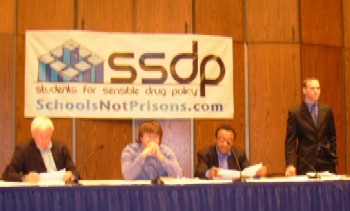Students for Sensible Drug Policy (SSDP), the nation's leading campus-based drug reform organization, held its annual conference last weekend in the shadow of the US Capitol in Washington, DC. More than 300 students from 70 campuses in the US and Canada heard from movement luminaries, studied the nuts and bolts of campus organizing, took care of organizational business, and put theory into practice with a day of lobbying for drug reform issues on Capitol Hill.

After being revved-up by a brief visit and pep-talk from Rep. Dennis Kucinich (D-OH) late Friday morning, students hit Congress to lobby for repeal of the law that spurred SSDP's formation in 1998, the Higher Education Act's drug provision, which so far has barred some 200,000 students from receiving financial aid because of drug convictions, and other issues like student drug testing.
In several instances, while meetings were set with staffers, members of Congress made at least brief appearances. In at least two meetings, with Rep. Jim McGovern (D-MA) and Rep. Bart Gordon (D-TN), students were able to sit down with the members themselves, Angell reported.
In addition to actually influencing members of Congress, SSDP's lobbying day had the added benefit of energizing the students. "A lot of them were really excited about lobby day," Angell explained. "This was the first time many of them had ever talked to legislative staffers about changing laws they care about."
"The whole thing has been very fulfilling -- I'm really learning a lot," said University of Maryland student Stacia Costner, who was one of more than three dozen Maryland students who showed up for the conference.
That made the Terrapin delegation one of the largest. Other states bringing dozens of students to Washington were Florida and Rhode Island.
But if the conference wasn't just about student activists meeting each other, that was still a big part of it. While much was learned on the Hill and in the conference's formal sessions, students took full advantage of their free time during the weekend to meet and greet each other, compare war stories, and share lessons learned.
Another student in attendance, Jimmy Devine of Franklin Pierce College in New Hampshire, told the Chronicle students there were starting a harm reduction center. "We want to provide factual information beyond 'just say no,'" he said. "We want to help kids, and this conference is going to help us learn how better to do that."
"One of the most exciting things was that students from all across the country were able to come together, meet one another, and realize they are not alone on their campuses, that there are other students just like them working on the same issues on their own campuses," said Angell. "It'll be exciting to see what happens on these 70 campuses when the students go back this semester."
"We are trying to build a real student movement," said SSDP executive director Kris Krane as he opened the conference itself Saturday morning. "We are a force to be reckoned with. We are recognized in Congress as a powerful lobbying force and in the press as a credible voice for change."
Given the national political atmosphere in recent years, SSDP's road has been bumpy after an initial meteoric rise, Krane conceded. "The war on terror made recruitment more difficult, and the number of chapters dipped," he said. "We shied away from the anti-war rhetoric, but this is the true anti-war movement for our generation. The excesses of the war on terror were preceded by the excesses of the war on drugs. Whether you are talking about snitches, asset forfeiture, racial profiling, or mandatory minimum sentences, every violation of individual rights and liberties in the Patriot Act got its start in the drug war."
After Krane opened the session, the students had the opportunity to hear from many of the most prominent leaders of the drug reform movement, including an opening panel consisting of Ethan Nadelmann of the Drug Policy Alliance, Allen St. Pierre of the National Organization for the Reform of Marijuana Laws, Steph Sherer of the medical marijuana defense group Americans for Safe Access, and representatives of the Marijuana Policy Project. Sadly, MPP executive director Rob Kampia, the man behind the Nevada marijuana tax and regulate initiative, was taken ill and unable to attend. He was replaced by MPP director of governmental relations Aaron Houston.
"We are the people who want to smoke pot and get high," said Nadelmann to the surprised laughter and cheers of the crowd. "It's meaningful in our lives, and we don't want to be treated as criminals. But that's not all we are. We are also the people who hate drugs. We wish there could be a drug-free society, but we realize the war on drugs is not the way to do it," Nadelmann continued. "And we are the people who don't really give a damn about drugs, but who care about the Bill of Rights, the Constitution, racial justice, and living in a society that ranks first in per capita incarceration. All of us believe the war on drugs is not the way."
Nadelmann delivered a chilling warning about the future of the drug war. "In the next five or ten years," he predicted, "incarceration rates may be leveling off, but more and more people will be controlled outside of prison cells. Drug testing is becoming ever more omnipresent, the use of electronic bracelets and GPS devices is growing, we are heading toward a total surveillance society," he prophesied. "Internal surveillance of your body and external surveillance of your behavior. Little by little, we become more accustomed to depriving more and more people of little bits of freedom. We are approaching a totalitarian society."
That prospect makes the struggle to end the drug war all the more critical, Nadelmann told the rapt crowd. "We are fighting for what is best for this country and for the values of the enlightenment," he said. "We are fighting for a society where nobody gets punished for what they put in their body absent harm to others."
One of the most well-attended Saturday sessions -- and one of SSDP's conference booking coups -- was the joint appearance by media mavens Chicago Tribune columnist Clarence Page and MSNBC pundit Bill Press, both of whom addressed the problematic nature of media coverage of the drug war. For Press, the run-of-the-mill, uncritical daily drug war reporting can largely be explained by reportorial fear and ignorance.
"Reporters don't know the issue and they believe the bullshit they're fed by the politicians and the drug czar," he said. "We've spent billions of dollars and it has gotten us nothing except a waste of money and full prisons. But reporters are also afraid if they start reporting seriously, they might hurt their careers."
For Page, it was less fear and ignorance than complacency and unawareness. "Most editors aren't against fairness in reporting in drug policy," said the nationally known commentator. "Our generation broke things open in the 1960s and 1970s, but there was so much movement toward decriminalization then that there is something of a false impression that we do a lot less marijuana law enforcement than we really do. The last three drug czars all told me 'we don't arrest anyone for marijuana anymore,'" Page laughed.
It wasn't just the old media addressing the conference. Some of the drug war blogosphere's brightest stars also made appearances. The Cato Institute's Radley Balko, author of the blog The Agitator, stunned students with his exposition on the growth of law enforcement SWAT teams and their permutation into essentially little more than drug squads.
"SWAT teams are expensive, and there aren't enough hostage takings and barricade situations to justify them, so we see a sort of mission creep where they are being used in less and less violent situations and are now primarily used for drug raids," Balko explained, citing his review of raids gone bad, "Overkill: The Rise of Paramilitary Policing in America." "There were about 3,000 SWAT raids a year in the early 1980s," Balko noted. "Today, there are 40,000 a year."

This reporter spoke about Afghanistan's opium trade at another well-attended panel, this one on international dimensions of US drug policy. I was joined by Sanho Tree of the Institute for Policy Studies Drug Policy Project, who illuminated the adverse results of coca crop eradication in Colombia. Also on the panel were prominent academic drug policy specialists Mark Kleiman of UCLA and Peter Reuter of the University of Maryland. Somewhat surprisingly, the panel saw little controversy, as Reuter and Kleiman both agreed with the other panelists that US efforts to address its domestic drug problem by attacking drug crops overseas produce at best marginal results.
For reasons of length, no single report can cover everything that went on in three days of lobbying, listening, and learning. Suffice it to say that SSDP crafted a comprehensive set of sessions and activities designed to inform and energize its student base.
And the organization is looking to the future. "What are we going to do about race and diversity?" SSDP's Krane asked a sea of mainly white faces at the farewell session. "What are our goals?" SSDP knows very well what its immediate goals are, but it has also shown it realizes that a successful movement needs constant introspection, not just constant action.
Comments
Outstanding speech by Ethan
Outstanding speech by Ethan Nadelman!
And good to hear about the action by Sensible Students!
TOTALISM
Dear People, 11/25/06
You are now living in a totalitarian dictatorship; have been ever since Ronald Reagan stole the election in 1980. How do you restore democracy?
1) get rid of illegal laws using a criminal defense strategy
2) reinvigor local/regional economies by allowing businesses other than corporate monopolies in our communities.
There is now group Mobilization against War and Occupation. The drug war is an illegal occupation of American society.
Lyle Courtsal
18405 Aurora Ave.N.#H-6
Seattle, WA 98133 USA
Add new comment